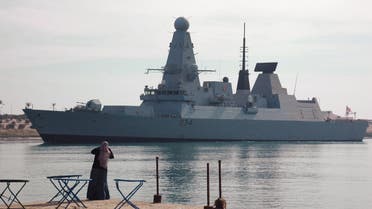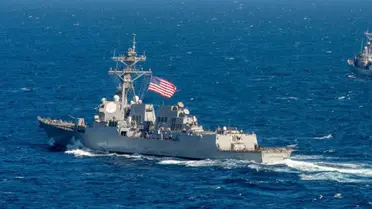Yemen’s Houthis say they attacked US ship ‘providing support’ to Israel
US looks for breakthrough after Hezbollah signals possible Lebanon-Israel border deal
New US ambassador arrives to Beirut this week alongside senior Biden aide
Yemen’s Iran-backed Houthis on Wednesday said they had fired drones and missiles at an American ship, after US and UK forces reported foiling a large attack in the Red Sea.
Military spokesman Yahya Saree said a “large number” of missiles and drones targeted a US ship that was “providing support” to Israel during its war against Hamas.
“The naval forces, the missile force, and the unmanned air force of the Yemeni armed forces carried out a joint military operation with a large number of ballistic and naval missiles and drones,” he said in a statement on X, formerly Twitter.
Saree did not give timing or a location for the attack. Earlier on Wednesday, the US military said American and British forces shot down 18 drones and three missiles launched by the Houthis toward international shipping lanes in the Red Sea.
It was the “largest attack… to date” by the Houthis in the Red Sea, UK Defense Secretary Grant Shapps said in a statement.
The Houthis, part of the “axis of resistance” of groups arrayed against Israel, have launched more than 100 drone and missile strikes in the Red Sea during the ongoing war in Gaza, according to Pentagon figure.

British defense minister Grant Shapps said on Wednesday the Royal Navy warship HMS Diamond was potentially targeted in an attack by Yemen-based Houthi militants in the Red Sea, which was repelled by US and British forces on Tuesday.
“My understanding is that both the ship itself potentially was targeted… but also that there’s a generalized attack on all shipping (in the region),” Shapps told reporters.
New US ambassador arrives to Beirut this week alongside senior Biden aide
Two senior American diplomats will arrive in Beirut this week as the US ramps up its efforts to avert a new war between Lebanon’s Hezbollah and Israel with the two sides currently in a low-intensity conflict.
While both sides have said they are not interested in an all-out war, Hezbollah says it has conducted over 600 operations targeting Israel in support of Hamas while Israel has carried out hundreds of strikes inside Lebanon. Israeli strikes and operations have also killed civilians, journalists and Lebanese soldiers, much to the frustration of the United States.
Most recently, Israel wiped out a senior Hamas official in the Hezbollah stronghold of Beirut’s southern suburbs before killing other senior Hezbollah officials in south Lebanon.
Israel, Hezbollah not looking for all-out war
But the Hezbollah secretary-general’s speech last week was seen in Washington as a sign that the Iran-backed group is not looking for an all-out war.
Speaking days after the Israeli strike that killed Hamas official Saleh al-Arouri, Nasrallah accused Israel of trying to drag Lebanon into another conflict.
Secretary of State Antony Blinken said Tuesday that it was “clear to me” that Israel does not want escalation.
Yet, officials and analysts who have visited Israel in recent weeks fear the chances for Israel to open a second front against Hezbollah is now more likely than it has been at any point. “If not now, for sure after the Gaza war because the Israeli military, political class and public is fed up with Hezbollah,” a former senior State Department official said.
“The US is the only side that will be able to stop this because the Israelis need ammunition and weapons. But the [Biden] administration also realizes the threat Hezbollah poses,” the former official said.
Nasrallah also doubled down on previous threats made in the week that his group would respond to the killing of al-Arouri and other Hamas officials.
Perhaps the most notable line of his speech was his tacit openness to discuss a deal to demarcate Lebanon’s disputed land border with Israel.
Nasrallah said Hezbollah joining Hamas’ “Al-Aqsa Flood” battle against Israel had created a “historic opportunity” to liberate occupied Lebanese territory by the Israelis. “We are in front of a historic opportunity to liberate every inch of our Lebanese lands and to prevent the enemy [Israel] from violating our borders and airspace,” he said.
Nasrallah was quick to say that talks or negotiations on the matter would be unacceptable until the end of the current Gaza war.
Now, Washington hopes to do all it can to ensure another war between Hezbollah and Israel doesn’t break out. Ensuring the Gaza war is contained and does not spill over into Lebanon will be one of the first objectives of the new US ambassador when she arrives later this week.
Amos Hochstein, who US President Joe Biden instructed to head a small team of American diplomats and officials to work on this mission, will also meet with Lebanese officials in Beirut this week.
Hochstein visited Israel last week and met with officials there to hear their thoughts and concerns over the contours of a potential deal.
A new war would take a heavy toll on Israel, its economy, its people and its army. Assessments suggest Lebanon would be devastated due to potential Israeli aerial bombardments.
US intelligence assessments have said that Israel would be hard-pressed to succeed in a new war due to its current war on Hamas. This was first reported by the Washington Post.
US officials are also calling on Israel not to target the Lebanese Armed Forces (LAF). The US sees the LAF as a solution to the problem in Lebanon, and they have proven to be a capable and reliable partner in the fight against ISIS as well as countering drug trafficking, American officials said.
An official Israeli government source said Hezbollah’s attacks were increasing the chance of opening a northern front, “which would wreak havoc on Lebanon.”
The government source also reiterated Israeli demands for a Hezbollah withdrawal from southern Lebanon.
“Israel will not accept the reality of a constant threat to its citizens and will respond to any attack launched from Lebanon,” the source told Al Arabiya English, adding that Israel was willing to find a diplomatic solution.
“Yet, in case of a failure to achieve such a solution, Israel will have to ensure security to its people,” the source said. “Hezbollah will bear the sole responsibility for the consequences if it chooses to open [a new war].”
Building on the US-brokered maritime border deal
The US successfully mediated the demarcation of Lebanon’s and Israel’s maritime borders last year after nearly a decade of diplomatic efforts. This was one of the few foreign policy successes of the Biden administration, which has taken a battering on the international stage due to its refusal to support a ceasefire in Gaza.
Unspoken rules of engagement between Lebanon’s Hezbollah and Israel since the end of the July 2006 war between the two have seen occasional exchanges of fire along the border. And after the outbreak of the Syrian war, Israel began targeting Hezbollah and other Iran-backed fighters there. That so-called shadow war between the two remained largely contained to Syrian lands. Nasrallah knows well that there was no appetite for war among a majority of the Lebanese population.
However, the latest Israeli operation in the Lebanese capital marked a dangerous turn, according to Nasrallah.
US officials attributed the Beirut strike to Israel and said they were not given a heads-up or notice before the operation.
Analysts point to previous US warnings to Israel not to open a second front on its northern border with Lebanon. In the hours after the October 7 Hamas attack, Israeli officials were on the brink of conducting preemptive strikes on Hezbollah targets along the border. US officials scrambled to dissuade them from doing so. Biden administration officials have continued to push these warnings in public and private messaging.
On the flip side, US officials warned Lebanon’s caretaker government against allowing the country to be a launchpad for attacks on Israel.
Washington’s first goal is to put an end to cross-border skirmishes and allow residents on both sides of the border to return to their homes. “And we’re on a diplomatic path to try to get that to happen,” the top US diplomat said during his Tuesday interview with MSNBC.
“As long as the Gaza war goes on, there will be no diplomatic breakthrough on the land border between the two countries,” said Randa Slim, Senior Fellow at the Washington-based Middle East Institute.
Al Arabiya English previously reported that a deal the US is considering pitching to both sides would fall under the full implementation of UN Resolution 1701, which ended the 2006 war.
The UN resolution called for no armed presence south of the Litani River other than those of the Lebanese Armed Forces and UN peacekeepers. It also called for Israel’s withdrawal from the northern part of Ghajar, which Lebanon claims. Syria claims the southern part.
At the time, the UN secretary-general, Kofi Annan, said there was a plan to ensure the Israeli withdrawal from the northern part of Ghajar.
The resolution was never fully implemented by Lebanon or Israel.
Mohanad Hage Ali, deputy director for research at the Malcolm H. Kerr Carnegie Middle East Center in Beirut, said rather than a final agreement, a process of negotiating a deal could begin. “This will be as important as the deal itself because this is a trust-building measure,” he told Al Arabiya English, highlighting that these talks were unlikely before a ceasefire in Gaza.
Additionally, the maritime border deal brokered by the US was limited to the sea because there are 13 disputed points along the UN-demarcated Blue Line between Lebanon and Israel.
On Friday, Nasrallah implied that Lebanon would be willing to discuss these 13 points, which would also have to include the Israelis pulling out of what the UN has said are Lebanese lands. Ghajar is divided by the so-called Blue Line, but Israel has occupied it since 2006 and was accused of building a wall around it in recent months.
According to Slim, Hezbollah’s two objectives, as stated by Nasrallah, will be to put pressure on Israel to stop the war and to assist people in Gaza by forcing Israel to divert some of its resources to the northern border.
If these points are all resolved and Israelis withdraw in return for Hezbollah pulling back its weapons and fighters from the southern border, the Iran-backed group, which dubs itself a “resistance,” will be able to claim “victory” among its supporters and even critics, analysts said.
A major deal that hasn’t been reached for decades is still farfetched. But the likelihood of beginning such talks on something that was out of the question until recently has gained momentum in Washington.
Hochstein’s trips to Beirut and Tel Aviv aim to explore a potential solution “once the political and security environment allows for indirect negotiations,” Slim added.


